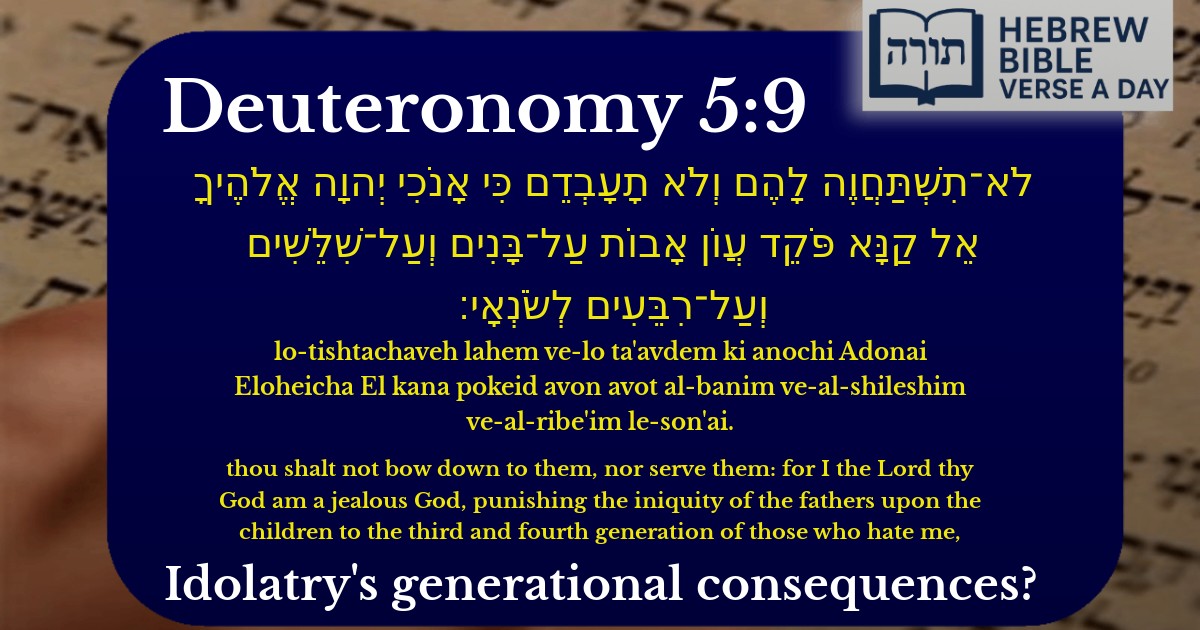Join Our Newsletter To Be Informed When New Videos Are Posted
Join the thousands of fellow Studends who rely on our videos to learn how to read the bible in Hebrew for free!
Hebrew Text
לֹא־תִשְׁתַּחֲוֶה לָהֶם וְלֹא תָעָבְדֵם כִּי אָנֹכִי יְהוָה אֱלֹהֶיךָ אֵל קַנָּא פֹּקֵד עֲוֺן אָבוֹת עַל־בָּנִים וְעַל־שִׁלֵּשִׁים וְעַל־רִבֵּעִים לְשֹׂנְאָי׃
English Translation
thou shalt not bow down to them, nor serve them: for I the Lord thy God am a jealous God, punishing the iniquity of the fathers upon the children to the third and fourth generation of those who hate me,
Transliteration
Lo-tishtachaveh lahem ve-lo ta'avdem ki anochi Adonai Eloheicha El kana pokeid avon avot al-banim ve-al-shileshim ve-al-ribe'im le-son'ai.
Hebrew Leining Text
לֹא־תִשְׁתַּחֲוֶ֥֣ה לָהֶ֖ם֮ וְלֹ֣א תׇעׇבְדֵ֑ם֒ כִּ֣י אָנֹכִ֞י יְהֹוָ֤ה אֱלֹהֶ֙יךָ֙ אֵ֣ל קַנָּ֔א פֹּ֠קֵ֠ד עֲוֺ֨ן אָב֧וֹת עַל־בָּנִ֛ים וְעַל־שִׁלֵּשִׁ֥ים וְעַל־רִבֵּעִ֖ים לְשֹׂנְאָֽ֑י׃
Parasha Commentary
📚 Talmud Citations
This verse is quoted in the Talmud.
📖 Sanhedrin 27b
The verse is discussed in the context of divine justice and the concept of collective punishment, with the Rabbis debating the interpretation of 'visiting the iniquity of the fathers upon the children.'
📖 Yoma 86b
The verse is referenced in a discussion about repentance and divine mercy, contrasting God's attribute of justice with His attribute of mercy.
📖 Makkot 24a
The verse is cited as part of a broader discussion on the principles of the Torah and the nature of divine commandments.


Prohibition Against Idolatry
The verse (Shemot 20:5) prohibits bowing down to or serving idols, emphasizing the exclusive worship of Hashem. Rashi explains that the phrase "לֹא־תִשְׁתַּחֲוֶה לָהֶם וְלֹא תָעָבְדֵם" ("thou shalt not bow down to them, nor serve them") includes both physical prostration (hishtachavayah) and any form of service (avodah) directed toward idols. The Rambam (Hilchot Avodah Zarah 2:1) elaborates that even gestures of reverence toward idols are forbidden, as they constitute a violation of the prohibition against idol worship.
Divine Jealousy and Justice
The verse describes Hashem as "אֵל קַנָּא" ("a jealous God"), which Rashi interprets as meaning that Hashem does not tolerate the worship of other deities. The Sforno adds that this jealousy is not arbitrary but stems from Hashem's role as the sole Creator and Sustainer of the world. The Rambam (Moreh Nevuchim 1:36) explains that divine "jealousy" is a metaphor for Hashem's absolute demand for exclusive devotion, as He is the source of all existence.
Punishment Across Generations
The verse states that Hashem punishes "עֲוֺן אָבוֹת עַל־בָּנִים" ("the iniquity of the fathers upon the children"), but this is qualified by the phrase "לְשֹׂנְאָי" ("of those who hate Me"). The Talmud (Sanhedrin 27b) clarifies that this applies only when the children continue in the sinful ways of their fathers. The Ramban emphasizes that divine justice is precise: punishment extends to later generations only if they perpetuate the sins of their ancestors. The Mechilta further notes that this principle is balanced by the following verse (Shemot 20:6), which promises kindness to thousands of generations of those who love Hashem.
Key Teachings from Commentators